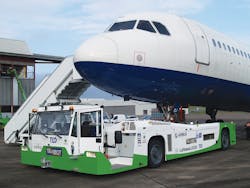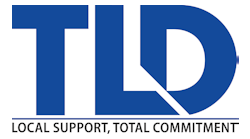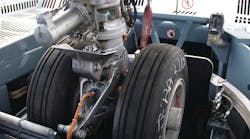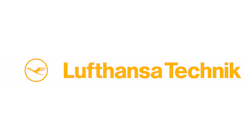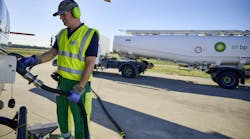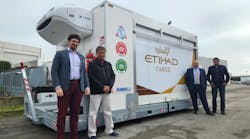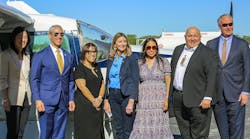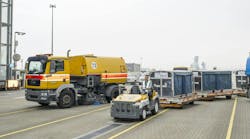Dubai, May 9 -- A reduction of fuel consumption by over 50 percent, along with the environment protection and boosting profitability of operations, have been on the wish list of airlines worldwide since a long time, but it will soon become a reality.
Unveiling the revolutionary TaxiBOT Operational Towing Concept at the opening of the 13th Airport Show taking place in Dubai, Mr. Valentin Schmitt, Chief Executive Officer, TLD Europe, said TaxiBOT was a semi-robotic towbarless tractor designed for Dispatch Towing from gate to runway, allowing taxiing with jet engines stopped.
Fitting right in with TLD's Green philosophy, TaxiBOT is a perfect encounter between ecological and economical interests of its customers, with global taxiing costs (fuel, FOD, carbon taxes) being reduced from US$ 8.7 billion to US$2.9 billion yearly globally, and CO2 emissions being cut by 20 million tonnes.
The Taxibot solves the problems of NLG fatigue loads and pilot verses driver liability during taxi towing, thanks to its innovative "Pilot In Control" concept: taxiing operation will be transparent to pilot, and fully automatic for driver, who will be only in charge of pushback and return back to the gate after disconnection.
Schmitt expressed confidence in the Middle East region's growth prospects for the aviation sector, and avers that TLD has been present here for years, with a focus on taking the ties to the next level this year, by collaborating with a regional airline soon.
He said: "This is one of the most dynamic aviation growth markets for the current time and long-term future. We are glad to participate in events like Airport Show to network with our customers, and bring something new into the region, as our way of helping this robust region grow."
He added that profits have already risen 30 percent for the company in the last year globally, with the Middle East generating a sizeable share of that growth.
Commenting on the launch of TaxiBOT's in the region sometime soon, he said that initial responses have been enthusiastic, with several key airlines telling TLD that there is a massive need for employing this prototype in actual airline operations at the earliest on a war-footing.
The new tractor is designed so that the aircraft's nose wheel connects to a rotary table on the TaxiBot. This allows the pilot to control the aircraft using the cockpit steering systems just as the cockpit crew would if the aircraft were moving under its own engine power.
Sophisticated sensors combined with velocity control and GPS enable the pilot to maneuver the aircraft easily.
Gabriel Camus, TaxiBOT Project Management Officer, Business Development Strategy & Future Programmes for Airbus, said that the fuel-saving could be tremendous, given that all aircraft on an average spend 21 minutes taxiing along the runway, saving maybe 16 to 17 minutes using TaxiBOTS.
He noted that the great advantages of the system would be that minor or no modifications on airplanes are required, no extra weight to the airplane and no reduction in the cargo bay space, a unique Pilot/ TaxiBOT interface and control system, which enables full pilot control of the vehicle using the existing airplane taxiing control means, a sophisticated speed and traction control which enables protection of the Nose Landing Gear (NLG) from exceeding maximum allowed fatigue load in real time throughout.
Lufthansa Technik's subsidiary LEOS, which has also been involved in early field tests of the concept, is looking at launching actual airline operations with TaxiBOT in August, initially with three such tractors.
Gerhard Baumgarten, Director Marketing & Sales for Lufthansa LEOS, said the airline which had been working on testing the concept on de-registered aircraft, was hopeful that this would greatly remove the strain on the world's fuel resources and reduce fuel costs, which eat into airlines' operating costs, with heavier aircraft that used more fuel for taxiing operations currently benefiting more in the long-term by switching to TaxiBOTS.
Having been conferred the distinction of the Innovation of the Year Award 2013 by the French Prime Minister, the first field tests of TaxiBOTs was carried out in Frankfurt, Germany on B747's in 2009, with another series at Toulouse in France on A340-600's in 2010.
Copyright 2013 Islamic Finance News, distributed by Contify.comAll Rights Reserved
